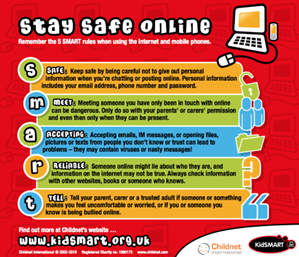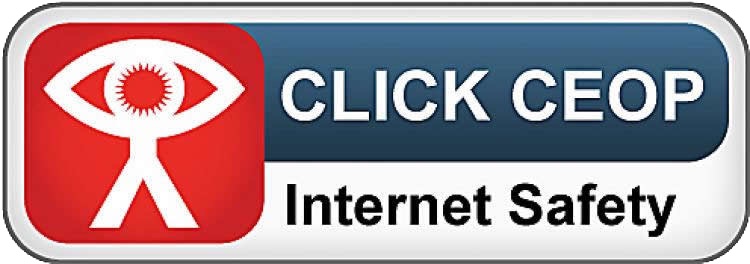Online Safety
As a school, we take our responsibility for safeguarding children seriously and we aim to protect them from harm. Part of this duty of care is to help children make informed choices to protect themselves. This includes keeping safe online. The internet can be a wonderful thing and a source of useful information. However, we must all be wary of potential issues and have strategies in place to protect ourselves.
We aim to support parents with safety messages and will discuss online safety in school, as part of our computing and Life Skills lessons.
The ‘SMART’ message is regularly shared as part of our Computing lessons and internet work.
We publicise Safer Internet Day each year and promote NSPCC resources. We also have access to SWGFL's 'Project Evolve' resources which are used in the event that we need to address a specific Online Safety issue.
Child Exploitation and Online Protection (CEOP)
This is a reporting tool if a child is worried about online abuse or the way someone has been communicating with them online. You can safely make a report via their website.
Safe Searching
Researching information is an important skill for our children to develop, but we recognise that this can be a way that they find unsuitable search results. We guide our children to use specific search terms as well as using search engines such as Swiggle - which is a child-friendly search engine from the Online Safety experts at SWGFL. We also reassure our children that telling an adult if they accidentally find something that makes them uncomfortable online will not get them into trouble and that we can help and support them if this happens.
Filtering and Monitoring
To ensure that all users of school devices are safe, we use Securly filtering and monitoring software. This ensures that the internet use of all users (children and staff) is tracked and reports are sent to key adults (Senior Leaders and DSLs) should any inappropriate behaviour be detected. In the event of any inappropriate use being detected, our behaviour and acceptance use policies are followed. This could include conversations with children and parents.
Further useful resources
Share Aware https://www.youtube.com/watch?v=LqqnxQzz17c
Lucy and the Boy https://www.youtube.com/watch?v=DY-D_tebNXs
I saw your willy https://www.youtube.com/watch?v=z1n9Jly3CQ8
Thinkuknow - Information for parents from CEOP.
Internet Matters - Information on a range of Online Safety subjects including: setting up devices, choosing age-appropriate apps and tips about how to discuss Online Safety with your children.
The CEOP YouTube channel also contains a variety of videos for parents and carers about different aspects of Online Safety.

